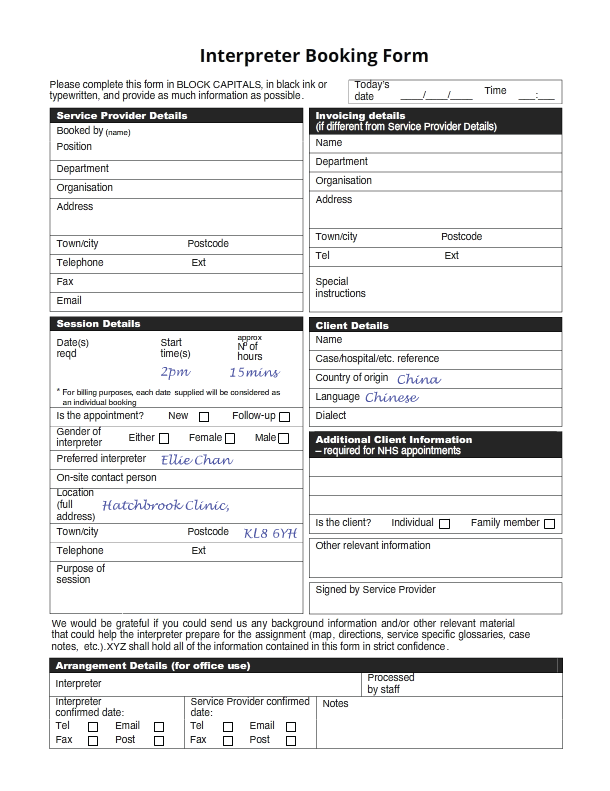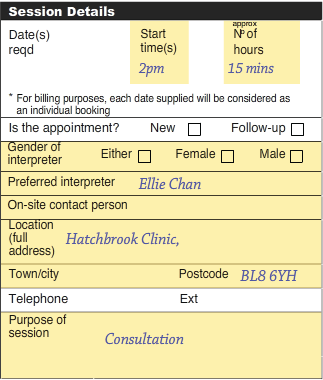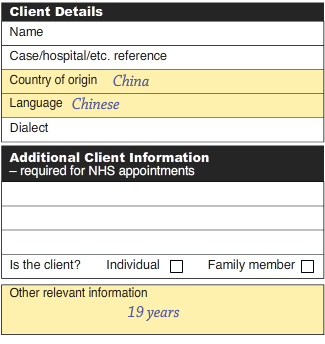Why use interpreters?
What do you think these words mean? Click them to find out...
It's possible that you speak Spanish or Slovak and know the meaning of these words. But many might hazard a guess with constipated, embarrassed and angina.
The article below highlights the crucial role of accurate communication for health - and the implications of getting it wrong:
48 hours later, when he had not improved, it was realised he was in fact suffering from a brain aneurysm.
By this time, brain damage had left him quadriplegic. The resultant lawsuit awarded $71 million dollars in damages to the man.
Reference
Harsham P. - a misinterpreted word with $71 million. Med Econ. 1984; June: 289– 292
Consider the following scenarios and indicate where you would book an interpreter:
Q1. You are a health visitor advising parents on supporting the healthy development of their young child. Do you think an interpreter is necessary?
YES
NO
Q2. You are a GP. Your patient’s English seems proficient, but you know that the conversation you are going to have will be stressful. Do you think an interpreter is necessary?
YES
NO
Q3. You are a practice nurse; your patient had an interpreter at the last appointment, but it seemed to make little difference to the communication as the patient barely spoke. Interpreter?
YES
NO
Q4. You are a mental health practitioner; you speak some French yourself having studied it at A-level. Your patient is Congolese. Interpreter?
YES
NO
Q5. You are a receptionist. A patient arrives with a family member who says they will interpret. They both seem pretty happy with the situation and it's probably a cultural thing. Interpreter?
YES
NO
A story on the importance of interpreters
In the following short clip, a professional interpreter talks about a real experience which emphasised the importance of her role in patient care.
As you watch, think about the following:
- What is the key message of the video?
- What implications does it have for your practice?
Lost in translation
Key message: communicating through interpreters reassures the clinicians that they have the correct information to work with and can reduce the stress of the situation for the patient.
Implications for practice: Engage interpreters from the start of your work with service users - it is good practice to also have a pre-consultation briefing with the interpreter.
Not using interpreters can have clinical complications.
Do not underestimate the positive impact of the rapport that a professional interpreter can bring to the quality and perception of care.
Arguments for using interpreters
RIGHTS
- Equality of access to information and services.
- People are entitled to interpreters (non-discriminatory provision).
Public Health England - Language interpreting and translation: migrant health guide, 2017.
USEFUL, EFFECTIVE SERVICE
Both parties need to have a clear understanding of each other; better provision means increased efficiency which equals less burden on systems.
STRESS
In times of crisis or stress, a person's English competency may decrease.
It is frightening and confusing not to be able to communicate.
RESEARCH
Multiple studies document that quality of care and satisfaction with care is compromised when professional interpreters are not used.
COST
The cost of missed appointments, increased incidence of unnecessary testing and the use of A&E, return visits and medical errors, a lack of compliance with treatments, inaccurate diagnoses and late entry into care build a significant argument for the use of professional interpreters.
Graham et al 2008 Health Services Utilisation by Low Income Limited English Proficient Adults. Journal of Immigrant Health, 10(3):207-17
What is a professional interpreter?
Consider whether the following statements are true or false.
Q1. An interpreter is anyone who can speak a second language fluently.
TRUE
FALSE
Q2. An interpreter is not the same as a translator.
TRUE
FALSE
Q3. An interpreter is employed to work on the service user's behalf.
TRUE
FALSE
Q4. A French interpreter will be equally at home interpreting for an Algerian or Congolese family.
TRUE
FALSE
Q5. It is acceptable for an interpreter to know the person they are interpreting for.
TRUE
FALSE
Summary: The professional interpreter
- Trained and qualified
- Literal language machine: no additions, no omissions, no editing or polishing of what is said by either side
- Clarifier: explains or makes word pictures of terms that have no linguistic/understandable equivalent and checks for understanding
- Culture broker: manages cross-cultural interactions to smooth and assist the communication process
Outside the interview:
- Advocate: action on behalf of the patient outside the bounds of an interpretive interview to highlight:
- Models of care as well as quality of communication
- Systemic barriers such as the complexity of the healthcare system or discrimination
Friends and family
Case study: Marenza
You meet Marenza. You feel that it would be useful to arrange a professional interpreter, but Marenza is not keen.
Why do you think this might be?
What approaches could you use to support service users in these situations?
There are two main issues here:
- The lack of knowledge about healthcare systems and entitlements
- Myths circulating in the community about the provision and quality of interpreters
Click Marenza's reasons in the panels below to see suggestions for addressing each issue.
"Last time I went to the GP, I needed medication, but the GP wouldn't give it. So the interpreter can't have had very good English to explain my symptoms."
"Last time I went to the GP, I needed medication, but the GP wouldn't give it. So the interpreter can't have had very good English to explain my symptoms."
Ensure staff are trained and aware of the entitlements to interpreters and the increased cost implications of not providing interpreters. Give them the resources they need to share this information e.g.: language identification chart.
"It’s a personal problem really. I don't want my personal information out in the community."
"It’s a personal problem really. I don't want my personal information out in the community."
Put clear, image based, targeted information in prominent places: e.g.: a simple poster in the healthcare reception area, job centre or popular food shop in community languages. State the entitlement to free professional interpreters.
"It's really expensive to get a private interpreter. I won’t to be able to afford this on top of the treatment costs."
"It's really expensive to get a private interpreter. I won’t to be able to afford this on top of the treatment costs."
Ensure staff are aware of the correct booking information to gather, and make a sound interpretive booking e.g. booking checklist.
"I know some people who’ve had interpreters in their asylum claim. They only speak for the authorities – not for us."
"I know some people who’ve had interpreters in their asylum claim. They only speak for the authorities – not for us."
Share information regarding interpreters through engagement with workplaces, community organisations, places of worship, schools, ESOL providers, advisory services etc or through attending community events.
"My friend was told an interpreter had been booked for his physio appointment. But when he turned up, the interpreter was a woman - he said he didn't know who was more embarrassed - him or her."
"My friend was told an interpreter had been booked for his physio appointment. But when he turned up, the interpreter was a woman - he said he didn't know who was more embarrassed - him or her."
Provide welcome packs with clear succinct facts to new arrivals through coordination with housing providers in your locality.
For more information, see the Reducing Barriers To Access module.
Marenza may choose to bring a friend to interpret for her as an ‘ad hoc interpreter’.
There are arguments for and against using family friends as interpreters.
Select for or against for each argument, then you can check your answers.
Arguments on using family and friends as interpreters:
They are readily available
FOR
AGAINST
They may filter information to protect their relatives or friends
FOR
AGAINST
They are not neutral
FOR
AGAINST
There may be a breach of privacy and confidentiality
FOR
AGAINST
They may try to control instead of facilitate
FOR
AGAINST
They are more likely to advocate and be proactive
FOR
AGAINST
They may be unable to cope with the subject matter, specialised terminology or emotional content
FOR
AGAINST
Their character and attitude is known
FOR
AGAINST
They are more likely to commit errors with potential clinical implications
FOR
AGAINST
Then maybe a lack of professionalism
FOR
AGAINST
There will be no indemnity if mistakes are made
FOR
AGAINST
They maybe more trusted due to shared history and understanding of issues
FOR
AGAINST
This exercise considers the use of family and friends as interpreters. Many of the arguments are equally relevant to the use of other ad hoc interpreters such as staff members or passers-by.
Regardless of professional knowledge another staff member is not qualified to act as a professional interpreter.
Negotiating the discussion
It's relatively straightforward to sit in a staff meeting and agree a policy of using professional interpreters. But when faced with a husband insisting on interpreting for his wife, what action could you take?
Click to reveal the scenarios in each case:
The communication could go well. Both patient and interpreter could appear happy with this situation.
However, be aware that:
- Without explaining the possibility of using a professional interpreter and its benefits, the patient is not exercising real choice.
- The decision may not reflect the patient’s wishes: how will you assess this?
- The ability of the interpreter may fluctuate: how will you know this and how will you react to it?
- The patient may change their mind: how will they report this?
Document the request.
- See the Resources and Links section for guidelines for ad hoc interpreters.
- Give opportunities for both the patient and the interpreter to change their mind and monitor their response.
- Ask for a short time alone with the patient.
- If necessary use the telephone interpreter to check information.
You will have adhered to your policy, but may find yourself with a patient who is withdrawn as the reasons for wanting her husband to be present are not being explored.
Be aware that:
- Her husband’s presence may be more to do with moral support than language support
- The patient may not be used to advocating on her own behalf
- Refusal to negotiate on these terms may mean that the couple do not return for future appointments
Equally, the slow start with a professional interpreter may be due to lack of experience, but this opportunity may be welcomed by the patient.
This may or may not be accepted by the patient's husband
Remember:
- Avoid dictating terms without explanation or discussion.
- Monitor reactions and consider alternatives; how can the policy work with patients and acknowledge legitimate concerns?
Highlight the patient’s and the couple’s choices in this situation. Listen to their response and monitor reactions as you discuss.
Outcome:
- The explanation you gave provided clear information and did not challenge the skills of the husband, so the couple are happier to accept a professional interpreter.
- Both remain for the interview this time.
- It has been highlighted that in this situation, everyone can contribute without the additional distraction of interpreting.
As the person leading the interview, you are able to engage both the patient and her husband in the conversation where applicable and demonstrate respect. This way, you are more likely to gain the trust of the family which will have a positive impact on future consultations.
Continue to monitor the responses of the patient to assess whether an individual appointment follow-up would be advisable.
Booking the interpreter
The booking process
You've had the discussion; the service user requires an interpreter for the next appointment.
You will need to fill a booking form to request an interpreter from the agency.
The following exercise looks at common errors made in the booking process and makes recommendations to avoid these mistakes. Resolving these issues means that both service provider and user have a better experience in the consultation and resources are saved in the process.
This booking form lacks important information and detail.
Click on the buttons below for suggestions to avoid common booking mistakes


Interpreters often run late due to inconsistencies in previous appointment times.
It might be useful to allocate sessions at the end of the day/morning session to allow for slippage and ensure the appointment can still go ahead.
Has this allowed double time for the interpreted session as well as time for the pre and post-interview briefings?
This information is vitally important to add regardless of the type of session, but particularly in mental health or personal matters.
Failure to do so may result in the interpreter not being able to go ahead with the session and time/resources being wasted on all sides.
If you are aiming for continuity, (this is especially important when building trust in mental-health scenarios, for example) find out what days your preferred interpreter works and make your service user's appointment at a time to match their work schedule.
Include details of the person running the session and who the interpreter should contact if they are delayed.
Be aware that interpreters are given a large number of appointments per day.
Consider access issues: many interpreters travel by public transport rather than car.
Adding more information about venues than just postcode will be useful. If you are aware of bus routes you can state them on the booking form.
If you are planning a home visit, state where you will meet for the pre-interview briefing. Note that it will not be appropriate to meet at the client’s house.
Some interpreters are more experienced with certain types of session. State the nature of the session, e.g.: interview, crisis, counselling - and also the purpose, e.g.: introduction to service etc.
As before, click the buttons below to reveal good practice recommendations.
The region may be useful to add as it may have a bearing on dialect; conversely place of birth may have no relation to the languages subsequently spoken.
This language information is not clear enough. The official language of China is Mandarin, but there are many more languages and dialects. Fortunately most of these have a common written form.
Show the service user the language ID chart so that they can choose the language which is best for them. The service user may speak more than one language, so check for the preferred language.
Please see the Resources section for the language ID chart and information on languages.
It is important to state whether the client is a child. An appropriate interpreter should be booked. For adults, consider the power dynamics and appropriateness and aim to match as far as possible for age.
When you are filling the booking form, consider:
- Will this information ensure the right booking?
- Is the information complete?
- Does your request take account of the practicalities of working with external staff?

Running to the consultation
The following exercise deals with the reality of the interpreted session itself and develops a series of good practice guidelines.
The video below presents a service provider's memory of an interpreted session. Imagine you are the service user in the session and, as you watch, consider the following questions:
- How would you feel by the end of this meeting?
- Would you trust the decisions made by the professional regarding your care?
- How likely are you to make a second appointment, as advised?
As the service user stated at the end of the video, there were many mistakes.
So, what was it about the interpreted session that reduced communication, trust and engagement?
To answer the following questions either recall the video or watch it again.
Answer - No:
- The chairs should be in a triangle shape to encourage more balanced communication.
- The table separates the interpreter and service user.
- The interpreter’s bag on the table almost blocks out the service user.
Answer - there are many possible responses, including:
- Both interpreter and service provider use “ask her” or “she said that” rather than speaking directly with the service user.
- The use of jargon is unhelpful and the amount of information given in each burst is too large.
- The interpreter is left in charge of defining key terms, such as ‘confidentiality’.
- The interpreter reveals personal information about the service user.
Answer
- There is no pre-interview briefing with the interpreter.
- There are no introductions.
- There is no time or attempt to build a rapport with the service user.
In the next video, the service provider discusses her recommendations for interpreted sessions with the benefit of hindsight.
Listen for her ideas on:
- Pre-consultation checks and preparation
- Troubleshooting with your team
- Pre-consultation briefings
- Room layout
- Building rapport and active listening
- Ending the interview and debriefing
Download a PDF of her recommendations
Follow-up and feedback
Best practice summary flow chart
Click the boxes to see the steps:
- Check appropriacy of interpreter
- Allocate double time for the interview
- Arrange the seating into triangle form
- Brief the interpreter about the case
- Establish the objectives and ground rules for the interview
- Obtain cultural background information
- If there is a problem during the interpretative interview, check:
- Do the interpreter and client know each other and is this the cause of the problem?
- If so, highlight confidentiality, but accept the client's request for a different interpreter.
- Do the interpreter and client speak the same language and dialect?
- If not, a new booking will be needed. Make a note on the file so this can be avoided next time.
- If the interpreter is a refugee from the same country of origin as the patient, are the interpreter and patient from opposing political factions?
- If a new booking is necessary, make a note on the file so that this can be avoided next time
- Are differences in gender, religion, ethnicity or cultural identity causing problems?
- Is a new booking necessary? Make a note on the file so this can be avoided next time
- Establish ground rules of the interpreting session
- Lead the session. You have responsibility for its success
- Speak directly to the client and not to the interpreter
- Speak clearly, concisely and naturally, and avoid jargon
- Summarise and check to ensure that the client understands the information
- Listen actively to both client and interpreter; monitor body language as well as words
- Debrief the interpreter, for feedback on interpreting or personality difficulties experienced during the interview
- Examine how the interview process could have been improved
- Sign the interpreter’s paperwork
- Give the interpreter the opportunity to explain any issues that may have come up in the interview
Dealing with concerns or feedback about the interpreted session
If you have concerns about the interview or interpreter, you need to take action to ensure they are not repeated.
Who should you speak to in order to solve the following problems? Tick the appropriate choice. You may choose more than one option. Once you have finished click the ‘check’ buttons for a response.
Without follow up, it is impossible to ensure an appropriate service and address problems practically
Problem 1: The interpreters are always late. Who should you speak to?
The interpreting service
Raise it at a staff meeting
The interpreter at debrief
Other
Problem 2: The interpreter has noticed that some patients have concerns about a particular staff member. Who should you speak to?
The interpreting service
Raise it at a staff meeting
The interpreter at debrief
Other
Problem 3: The interpreter does not always fit the booking request. Who should you speak to?
The interpreting service
Raise it at a staff meeting
The interpreter at debrief
Other
Summary
Studies have shown that the use of qualified medical interpreters:
- Improves patient satisfaction of both disease and treatment
- Increases delivery of preventative health measures
- Reduces unmanaged pain
- Improves patient understanding of both disease and treatment
The correct booking information is essential, as well as the use of appropriate language and the allocation of sufficient time in the interview setting. Pre- and post-consultation briefings/meetings ensure that questions may be raised and answered.
If patients cannot properly communicate their health information, there are risks of:
- Misdiagnosis
- Inappropriate treatment
- Disengagement with services
- Escalation in cost due to late treatment of more advanced symptoms
These issues may result in the liability risks as well as the delivery of poor healthcare. In an environment of cost-cutting, the cost saving impact of ensuring more appropriate and timely care through using interpreters deserves strong emphasis.

